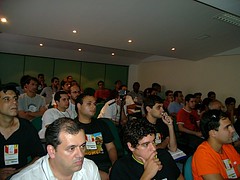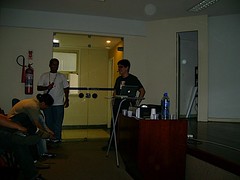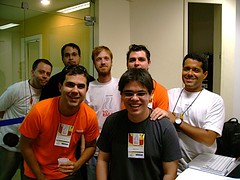Clique aqui para ler em Português
I’m one of the organizers of the program committee for Agile Brazil 2010, and we’re very happy to announce that ThoughtWorks has agreed to sponsor the visit of Martin Fowler, our Chief Scientist, as one of our keynote speakers. Since this is Martin’s first visit to Brazil, I decided to ask him some questions that I thought would be of interest to the participants, and he has kindly agreed to participate in this mini-interview:
Q: What have been keeping you busy lately?
Martin Fowler: Overwhelmingly it’s my upcoming book on DSLs. I found writing books to be hard work, and it’s actually getting harder. By June I expect all of the content will be cast so my mind will be able to get away from it – which I’m very much looking forward to.
Q: What are your expectations about Agile Brazil 2010?
MF: I try not to have expectations about things, that way my mind can be open to the reality when I see it. I’ve been doing conferences frequently for two decades now, so it’s hard to get excited about them. I am excited about coming to Brazil. It will be my first time in South America and both I and my wife have long wanted to come down.
Q: What are you going to talk about in your keynote?
MF: I have no idea. I often don’t decide on my keynote until very close to speaking – often doing extemporaneous talks <http://martinfowler.com/bliki/ExtemporarySpeaking.html>. Recently I’ve been doing keynote talks consisting of three or so talklets, some with slides, some without. But exactly how I’ll do it is something I may only decide the night before.
Q: How do you see the Brazilian software community influencing the future of Agile?
MF: It’s hard to say, as I’m not that familiar with the Brazilian software world. I’ve been very impressed by the Brazilian ThoughtWorkers I’ve met over the years, so I know there’s great potential here. I’m generally keen to see more varied cultures contribute to the software world, I think it’s an important part of us growing as a profession.
Agile Brazil 2010 is going to be an incredible conference, and we’re inviting speakers to submit session proposals (the deadline is approaching: 28/Feb!). Don’t miss the chance to see and talk to Martin Fowler, as he’s one of the few speakers I know of that can put together a first-class keynote on the night before :-)
Don’t forget to follow @agilebrazil on Twitter for conference news, and hope to see you there!
Como um dos organizadores do comitê de programa da Agile Brazil 2010, estamos felizes em anunciar que a ThoughtWorks aceitou patrocinar a visita de Martin Fowler, nosso Cientista-Chefe, como um dos keynotes do evento. Como esta será a primeira vez que Martin visita o Brasil, decidi fazer algumas perguntas que julguei interessantes para os participantes do evento, e ele concordou gentilmente em participar desta mini-entrevista:
P: O que tem te mantido ocupado ultimamente?
Martin Fowler: Surpreendentemente é o meu novo livro sobre DSLs. Eu acho que escrever livros é um trabalho árduo e na verdade isso tem se tornado cada vez mais difÃcil. Até Junho eu espero que todo o conteúdo esteja definido assim isso vai poder sair um pouco da minha cabeça – algo que estou realmente ansioso para acontecer.
P: Quais são suas expectativas para a Agile Brazil 2010?
MF: Eu tento não criar expectativas sobre essas coisas, assim minha mente pode estar aberta para a realidade quando eu a ver. Eu tenho participado de conferências frequentemente há duas décadas, então acho difÃcil me empolgar com elas. Mas estou empolgado em visitar o Brasil. Esta será minha primeira vez na América do Sul e tanto eu quanto minha esposa estamos ansiosos há tempos por essa visita.
P: O que você irá abordar no seu keynote?
MF: Eu não tenho idéia. Eu geralmente não decido o assunto do meu keynote até uma data muito próxima do evento – geralmente fazendo palestras extemporâneas (improvisadas) <http://martinfowler.com/bliki/ExtemporarySpeaking.html>. Recentemente eu tenho feito keynotes com em torno de três pequenas palestras, algumas com slides, outras não. Porém decidir exatamente como irei fazê-lo vai ser algo que eu possivelmente decida na noite anterior.
P: Como você vê a comunidade brasileira de software influenciando o futuro dos Métodos Ãgeis?
MF: É difÃcil dizer, pois não estou tão familiarizado com o mundo de software brasileiro. Eu tenho me impressionado bastante com os ThoughtWorkers brasileiros que conheci ao longo dos anos, então eu sei que existe um grande potencial aqui. Em geral eu gosto de ver uma variedade maior de culturas contribuindo para o mundo do software, pois acredito que seja uma parte importante para crescermos como profissão.
A Agile Brazil 2010 vai ser uma conferência incrÃvel, e estamos convidando palestrantes para submeterem propostas de sessão (a data limite está se aproximando: 28/Fev!). Não perca a oportunidade de ver e conhecer o Martin Fowler pessoalmente, pois ele é um dos poucos palestrantes que conheço que consegue preparar um keynote da mais alta qualidade na noite anterior :-)
Não esqueça de seguir @agilebrazil no Twitter para notÃcias da conferência, e espero ver vocês por lá!











 Twitter
Twitter LinkedIn
LinkedIn Facebook
Facebook Flickr
Flickr